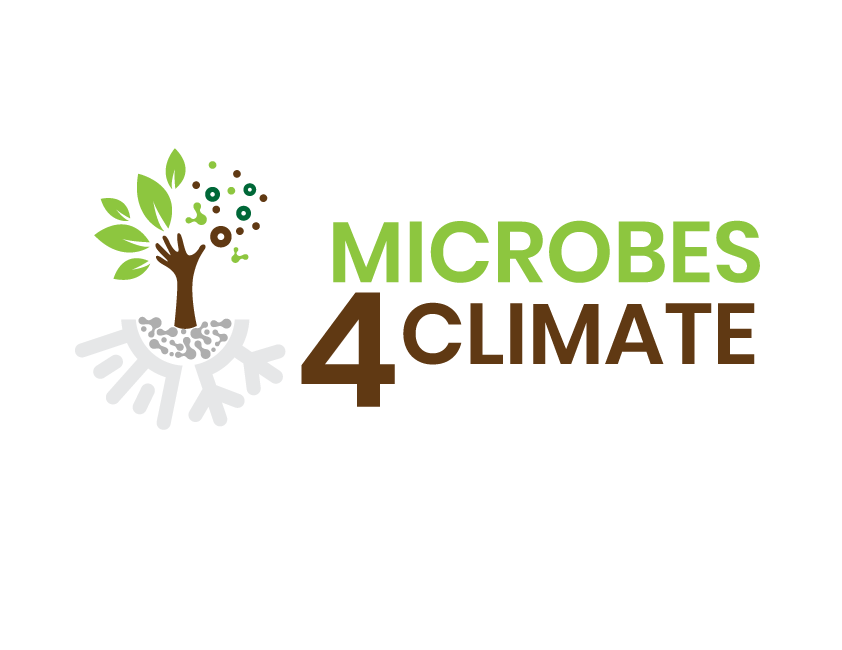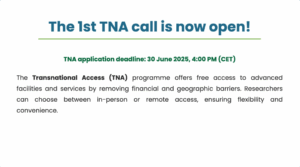MICROBES-4-CLIMATE provides access to 144 cutting-edge research services across Europe, catering to both academic and industry researchers. These services support curiosity-driven research addressing complex interactions between microorganisms, plants, soil, and the environment, all within the framework of Climate Change.
What type of services are offered through TNAs?
MICROBES-4-CLIMATE provides an extensive range of Transnational Access (TNA) services and facilities to support groundbreaking research in addressing climate change and its impact on biodiversity and ecosystems. These services include the supply and preservation of biological resources, by ensuring that high-quality, well-maintained microbial resources are accessible to researchers worldwide. The project further supports the isolation, identification, and characterisation of microbial resources from soil and plant samples, offering a comprehensive understanding of microbial diversity and its potential applications. To exploit the research outcomes, on-site access to specialised facilities is provided for controlled plant cultivation and phenotyping. Advanced soil and plant characterisation technologies are also made available, enabling detailed analysis of ecosystems and agricultural systems. The project harnesses cutting-edge Big Data and Machine Learning infrastructure and tools to facilitate data-driven approaches and innovative solutions. Additionally, remote consultancy services are offered to guide researchers in fully leveraging these resources, ensuring that M4C remains a key partner in the promotion of sustainable research and innovation.
MICROBES-4-CLIMATE provides access to a broad range of high-quality microorganisms, their derivatives and associated data to support advanced research and innovation in microbial and environmental studies. The strains can be delivered lyophilised (facilitating transport and preservation), as active cultures for immediate use in experimental applications, or as DNA extracts, enabling molecular analyses and genomic research. DNA from soil samples are also available to support studies on soil microbiomes and environmental sustainability. By ensuring reliable access to these high-quality resources, the project facilitates groundbreaking research addressing climate challenges and promoting sustainable solutions.
All the services listed in this section are accessed remotely.
The services for preservation of biological resources ensure the secure and long-term storage of valuable microbial and soil samples. These include safe deposit options for microbial strains, by offering tailored storage solutions such as safe deposit per strain for specified durations. Public deposits allow for open access to strains, supporting broader research and collaboration efforts. Additionally, the cryopreservation of soil samples ensures the integrity and viability of critical resources for future studies. All preservation services are carried out under strict quality standards, ensuring the viability and integrity of the resources over time. Detailed information on each preservation service is provided in the subsections from Table 2, outlining the scope and conditions of the resources available for deposit and conservation.
All the services listed in this section are accessed remotely.
Within this section, a comprehensive set of services are provided for the isolation of microbial resources from soil and plant samples. These include the isolation of fungal strains from diverse substrates, such as soil, plant materials, and diseased plant tissues, ensuring the recovery of high-quality microbial strains. Advanced culturomics methodologies are employed to isolate, purify, and dereplicate bacterial isolates, facilitating a deeper understanding of microbial diversity. Additionally, tailored sampling strategies are developed in collaboration with users to optimise microbial isolation processes. Specific culturomics approaches are applied to soil samples to both discriminate functional activities and explore microbial biodiversity, addressing critical research and application needs. These services provide cutting-edge tools to support microbial discovery and characterisation for a wide range of scientific and industrial purposes.
All the services listed in this section are accessed remotely.
Within this section, a comprehensive list of resources and services is available to support the identification and characterisation of microbial resources. Tailored to meet the needs of advanced microbiological research, these offerings facilitate the analysis of microbial diversity, functional attributes, and genomic features, using state-of-the-art techniques and methodologies. The catalogue includes services for microbial identification through genotypic and phenotypic approaches, advanced imaging, whole genome sequencing, and molecular characterisation of bacteria, fungi, yeast, and viruses. Additionally, it offers tools for assessing microbial functionality, such as antimicrobial activity, phytoprotection, and root colonization studies, as well as innovative techniques like metabarcoding and metagenomic analyses. Each resource and service is designed to adhere to high scientific standards, by ensuring accuracy, reproducibility, and reliability. Detailed descriptions and access procedures are provided in the subsections below.
All the services listed in this section are accessed remotely.
Within this section, a suite of advanced tools and methodologies is offered for the detailed characterisation of soil and plant systems. These resources are designed to enable high-precision analysis of structural, functional, and molecular traits, supporting cutting-edge research in soil and plant sciences. The available services include analytical platforms, eDNA analysis, and specialised instrumentation for imaging and data integration. Techniques such as Magnetic Resonance Imaging (MRI) and multiscale X-ray Computed Tomography (XCT) provide innovative solutions for studying dynamic changes and structural features in plants and soils. Each technique and service is meticulously designed to deliver reliable and reproducible results.
On-site access to state-of-the-art facilities dedicated to microbial discovery and analysis are further provided within M4C services. Researchers can access our partners’ installations to isolate, assess, explore, identify, characterize and preserve a broad diversity of microbial groups. These comprehensive facilities are pivotal for advancing microbial research and biodiversity conservation. Detailed descriptions and access procedures are provided in the subsections below.
All the services listed in this section are accessed physically.
Within this section, an extensive list of resources is available for controlled plant cultivation and phenotyping, designed to enable researchers to study plant growth, development, and responses under various environmental conditions. These facilities support a wide range of experimental setups, from field-scale trials to highly controlled indoor environments. Services include open-air platforms, controlled environmental systems, and specialised experimental fields for field-scale research. There are also cutting-edge technologies for non-invasive phenotyping, soil-plant-microbe interactions, and environmental stressors like ozone exposure. Additionally, automated high-throughput systems enable precise measurement of plant traits, while advanced imaging technologies support detailed analysis of plant performance. Each resource offers unique capabilities tailored to different aspects of plant and ecosystem research. Details of the specific services and how they can be accessed are provided below.
All the services listed in this section are accessed physically.
Within this section, a list of services to access cutting-edge computational services, data management tools, and AI-driven solutions designed to support complex bioinformatics and data science workflows is provided. These resources are specifically tailored to meet the needs of researchers working with large-scale biological data, enabling the efficient processing, analysis, and interpretation of diverse datasets. The catalogue includes virtual machine services for hosting computational tasks, along with dedicated support for bioinformatics workflows. It also offers tools for data FAIRification, by ensuring smooth data traceability, access, and integration across organisations. Additionally, AI and data science services are available to support the development and execution of custom workflows, as well as the creation of AI-based solutions for specific research needs. Detailed descriptions of the available services and further accesses are provided in the following subsections.
All the services listed in this section are accessed remotely.
Within this section, a list of specialised consultancy services is provided to support research and development across various biological and microbiological domains. These services provide expert guidance on a range of topics, including microbial genomics, bioinformatics, and AI applications, ensuring that researchers have access to the latest scientific insights and technologies. Consultancy options cover areas such as microbial culture collections, regulatory matters, and the establishment of connections with industry networks, including those in the U.S. Specific consultancy services are also available to facilitate training programmes and provide expertise aligned with MIRRI Clusters of Expertise. Detailed descriptions of each consultancy service and the expertise available are provided in the subsections below.
All the services listed in this section are accessed remotely.
Explore the service catalog to discover advanced tools, resources, and installations managed by the 5 research infrastructures in the M4C consortium. Visit the Transnational Access Programme to learn about eligibility and application guidelines for accessing these services.


